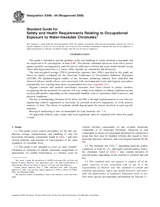We need your consent to use the individual data so that you can see information about your interests, among other things. Click "OK" to give your consent.
ASTM E848-94(2006)
Standard Guide for Safety and Health Requirements Relating to Occupational Exposure to Water-Insoluble Chromates
STANDARD published on 1.6.2006
The information about the standard:
Designation standards: ASTM E848-94(2006)
Note: WITHDRAWN
Publication date standards: 1.6.2006
SKU: NS-48251
The number of pages: 12
Approximate weight : 36 g (0.08 lbs)
Country: American technical standard
Category: Technical standards ASTM
Annotation of standard text ASTM E848-94(2006) :
Keywords:
chromium, chromium based pigments, chromium compounds, exposure, health, hexavalent chromium, insoluble chromium, safety, ICS Number Code 13.100 (Occupational safety. Industrial hygiene)
Additional information
| Significance and Use | ||||||||||||||
|
This guide includes chromates that are not readily soluble in water and that have water solubilities (Chromate ION) within the range of the more soluble calcium chromate and the much less soluble lead chromate. The major occupations involving potential exposure to insoluble chromates are in roasting of chromite ore, the manufacture of chromate pigments, the manufacture of coatings containing chromate pigments, and spray painting with these coatings. There is insufficient evidence to conclude that trivalent chromium compounds are carcinogenic. |
||||||||||||||
| 1. Scope | ||||||||||||||
|
1.1 This guide covers control procedures for the safe production, storage, transportation, and handling of only the hexavalent chromium compounds found in and their various hydrates, and mixtures of coprecipitates of the same regardless of crystalline form. 1.2 This guide is not intended to cover ( a) such "soluble" chromates as chromates of sodium, potassium, magnesium, or ammonium; (b) soluble bichromates; (c) chromic acid; (d) volatile chromyl compounds; (e) any trivalent chromium compound; or (f) elemental chromium. Omission of said compounds or classes of compounds should not be construed to mean that they may be handled without due regard to their particular physical, chemical, and toxicological hazards (, , ). 1.3 The chromate ion, CrO42, depending upon the acidity, complexes to form di-, tri-, and higher polychromates; hence, the chromates listed in may contain mixtures of polychromates, depending on the method of isolation and end use. This standard does not purport to address all of the safety concerns, if any, associated with its use. It is the responsibility of whoever uses this standard to consult and establish appropriate safety and health practices and determine the applicability of regulatory limitations prior to use. (For more specific precautionary information see Section 5.) |
||||||||||||||
| 2. Referenced Documents | ||||||||||||||
|
We recommend:
Technical standards updating
Do you want to make sure you use only the valid technical standards?
We can offer you a solution which will provide you a monthly overview concerning the updating of standards which you use.
Would you like to know more? Look at this page.




 Cookies
Cookies
